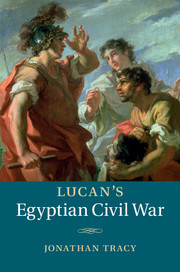Description
Lucan's Egyptian Civil War
Author: Tracy Jonathan
Explores how a cultural clash between traditional Pharaonic and latter-day Ptolemaic Egypt is used to mirror the Roman civil war.
Language: English
Subject for Lucan's Egyptian Civil War:
Approximative price 80.20 €
In Print (Delivery period: 14 days).
Add to cart
Publication date: 09-2014
302 p. · 16x23.5 cm · Hardback
302 p. · 16x23.5 cm · Hardback
Description
/li>Contents
/li>Biography
/li>
This book explores Lucan's highly original deployment of contradictory Greco-Roman stereotypes about Egypt (utopian vs. xenophobic) as a means of reflecting on the violent tensions within his own society (conservatism vs. Caesarism). Lucan shows the two distinct facets of first-century BC Egypt, namely its ancient Pharaonic heritage and its latter-day Hellenistic culture under the Ptolemies, not only in spiritual conflict with one another (via the opposed characters of Acoreus, priest of old Memphis, and the Alexandrian courtier Pothinus) but also inextricably entangled with the corresponding factions of the Roman civil war and of Nero's Rome. Dr Tracy also connects Lucan's portrayal of Egypt and the Nile to his critical engagement with Greco-Roman discourse on natural science, particularly the Naturales Quaestiones of his uncle Seneca the Younger. Lastly, he examines Lucan's attitude toward the value of cultural diversity within the increasingly monocultural environment of the Roman Mediterranean.
Introduction: the comforts of distance; Part I. Pompey in Egypt: 1. See Pompey run; 2. The fatal case for Egypt; 3. Memphis vs. Alexandria; Part II. Caesar in Egypt: 4. A pilgrim's progress?; 5. The context of Acoreus; 6. The lessons of Acoreus; 7. Memphis vs. Alexandria II; Conclusion: from seclusion to solidarity.
Jonathan Tracy is Assistant Professor in the Department of Classics at the University of Toronto. He has published widely on Lucan and Egypt and is currently working on a second book, on the evolution of Roman attitudes toward the decline and fall of Pharaonic Egypt from Virgil and the Actium generation of Roman poets to Menander Protector and Theophylact Simocatta, the final classicizing historians of late antiquity.
© 2024 LAVOISIER S.A.S.




